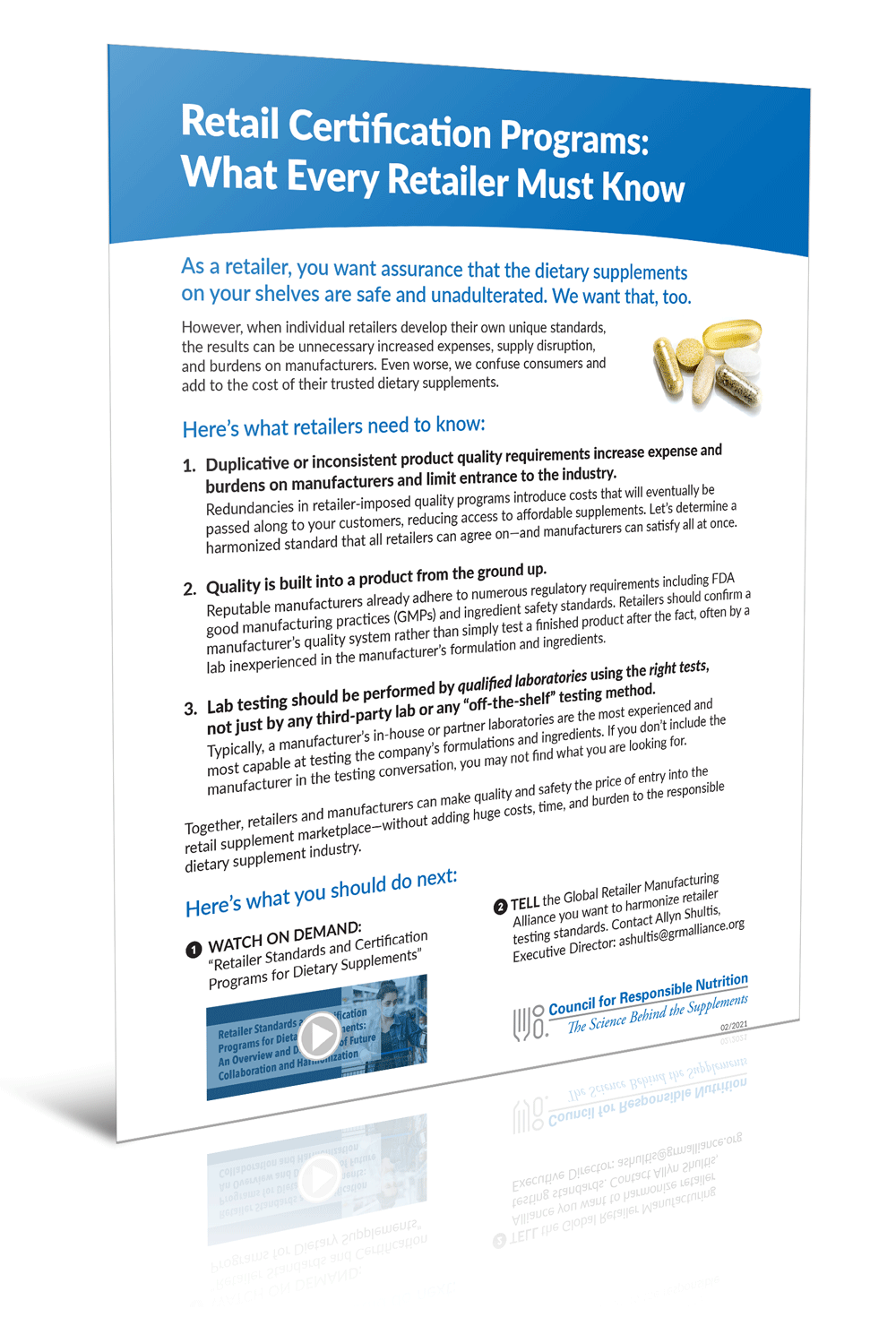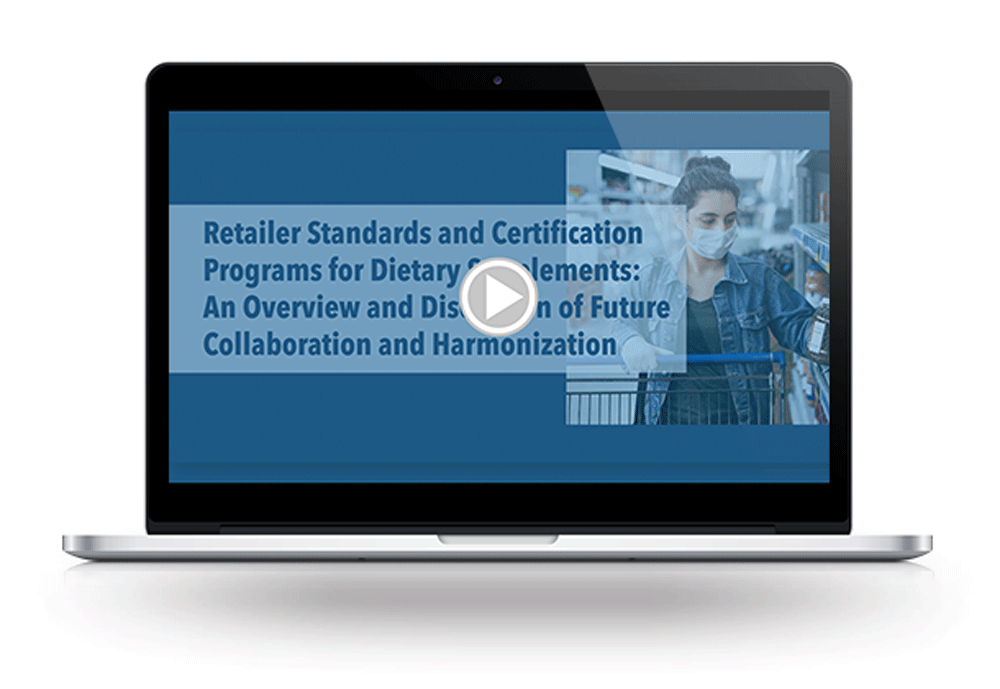FEBRUARY 2021 EXTRA

Past Editions—Need to Know Archives
Harmonizing retail certification standards: Good for retailers, manufacturers, and consumers
 Retailers want assurance that the dietary supplements on their store shelves are safe and unadulterated. CRN and responsible industry want this, too. Third-party certifications can help manufacturers promote the quality and safety of their products and help retailers like you assess these products before stocking them on your shelves.
Retailers want assurance that the dietary supplements on their store shelves are safe and unadulterated. CRN and responsible industry want this, too. Third-party certifications can help manufacturers promote the quality and safety of their products and help retailers like you assess these products before stocking them on your shelves.
However, when individual retailers develop their own unique standards, the results can be unnecessary increased expenses, supply disruption, and burdens on manufacturers. Even worse, a patchwork of standards can confuse consumers and add to the cost of the dietary supplements they rely on to support their health and wellness.
What do retailers need to know?
 Duplicative or inconsistent product quality requirements increase expense and burdens on manufacturers and limit entrance to the industry.
Duplicative or inconsistent product quality requirements increase expense and burdens on manufacturers and limit entrance to the industry.- Quality is built into a product from the ground up. Reputable manufacturers already adhere to numerous regulatory requirements including FDA good manufacturing practices (GMPs) and ingredient safety standards.
- Lab testing should be performed by qualified laboratories using the right tests, not just by any third-party lab or "off the shelf" testing method.
Learn more and get involved: Download CRN's one-pager, "Retail Certification Programs: What Every Retailer Must Know," which outlines precisely what retailers need to know about certification programs and provides resources to help you engage in ongoing industry initiatives to harmonize standards. Contact CRN's Megan Olsen with any questions.
CRN survey data reveals the importance of harmonizing retail standards for consumers
Patchwork retail certification standards not only add unnecessary burdens and costs to manufacturers, but they can also negatively impact consumers. Cost increases taken on by the manufacturers eventually fall to consumers and limit access to these beneficial products.
Additionally, varying standards have the potential to confuse consumers when purchasing supplements across different retailers. As revealed in data from the 2020 CRN Consumer Survey, supplement users pay close attention to product labels and rely on them to help make smart purchasing decisions.
Consumers say that product label (67%), price (49%), and doctor recommendations (47%) are among the most important purchasing factors for supplement users. Among supplement users who prioritize product labels when shopping for supplements, nearly one-third (30%) cite a quality seal (e.g., NSF International, Nutrasource, UL, USP, Eurofins, Informed Choice, and Banned Substances Control Group) as the most important label consideration.
Harmonizing testing standards will lead to more consistent products for consumers, support a stronger and safer supplement marketplace, and help manufacturers demonstrate GMP compliance to retailers and consumers.
TOP SUPPLEMENT PURCHASING FACTORS
Source: 2020 CRN Consumer Survey on Dietary Supplements
Hear directly from manufacturers in CRN's 'Understanding Retail Certification Programs' webinar
 CRN hosted a members-only webinar Tuesday, Jan. 26 to examine manufacturers' increasing concerns about retailer-imposed certification programs for dietary supplements.
CRN hosted a members-only webinar Tuesday, Jan. 26 to examine manufacturers' increasing concerns about retailer-imposed certification programs for dietary supplements.
Although the webinar was developed for a closed audience of CRN members, retailers may watch a replay of the webinar and panel discussion, to learn how harmonized standards can benefit everyone. Access the webinar using this link; the recording link will be emailed to you. Contact CRN's Maya English with questions.
Roundup: Articles outlining CRN's action to harmonize standards
- "CRN seeks to engage retailers on quality of in-house labs, reliability of GMP audits," NutraIngredientsUSA
- "Patchwork of new retailer-driven supplement standards alarms some industry members," Nutritional Outlook
- “2020: The Year We Woke Up to Our Interdependence with Retailers,” Nutrition Industry Executive
- “CRN: Quality Is the Price of Entry – Not a Point of Difference,” NutraIngredientsUSA
- “Amazon Tightens Requirements for Supplements – Here’s What You Should Know,” Netrush
Here's what to do next:
CRN encourages the retail community to take advantage of the resources provided here to learn more about the impact of retail certification standards. Check out CRN's January Need to Know and new one-pager to learn more about the history of patchwork standards and see how responsible industry is working together to find a solution that will benefit manufacturers, retailers and consumers.
Together, retailers and manufacturers can make quality and safety the price of entry into the retail supplement marketplace—without adding huge costs, time, and burden to the responsible dietary supplement industry and consumers. Contact CRN's Megan Olsen for more information about how CRN is working to harmonize retail standard programs.

